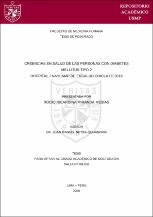Mostrar el registro sencillo del ítem
Creencias en salud de las personas con diabetes mellitus tipo 2 Hospital I Naylamp de Essalud Chiclayo 2018
| dc.contributor.advisor | Neyra Quijandría, Joan Manuel | |
| dc.contributor.author | Miranda Mesías, Rocío Ricardina | |
| dc.date.accessioned | 2020-10-26T23:47:36Z | |
| dc.date.available | 2020-10-26T23:47:36Z | |
| dc.date.issued | 2020 | |
| dc.identifier.citation | Miranda Mesías, R. (2020). Creencias en salud de las personas con diabetes mellitus tipo 2 Hospital I Naylamp de Essalud Chiclayo 2018 [Tesis de doctorado]. Lima: Universidad de San Martín de Porres, Facultad de Medicina Humana; 186 p. | es_PE |
| dc.identifier.uri | https://hdl.handle.net/20.500.12727/6587 | |
| dc.description | RESUMEN Objetivo: Identificar las creencias que constituyen una barrera para el control metabólico y los factores asociados al buen control de los pacientes con diabetes mellitus tipo 2. Método: Se realizó un estudio mixto. El cuantitativo, es un diseño observacional, de tipo transversal y analítico, donde se encuestó a 350 pacientes sobre datos sociodemográficos, comorbilidades, tratamiento, estilos de vida y de la historia clínica se obtuvo el índice de masa corporal y hemoglobina glicosilada. El cualitativo es un diseño etnográfico y se efectuó una entrevista abierta semiestructurada a 22 pacientes, número escogido por técnica de saturación. Se realizó la grabación y transcripción manual. Se uso SPSS Statics 20 para el análisis descriptivo, bivariado y multivariado. Se empleó Chi cuadrado, se consideró el valor de p < 0.05 como estadísticamente significativo. Resultados: El 52% tuvo un buen control metabólico. La frecuencia del sobrepeso, obesidad e hipertensión arterial fue de 57%, 19% y 48% respectivamente. 48% reportó consumir una dieta baja en hidratos de carbono, 36% realizar actividad física y 62% usar terapia complementaria. Yacón, moringa, alpiste y canela fueron las cuatro plantas más usadas. Grupo etario (p = 0.002), grado de instrucción (p = 0.002), índice de masa corporal (p = 0.000) y dieta baja en carbohidratos (p = 0.000) fueron asociadas al buen control. Acontecimientos vitales estresantes y estilos de vida no saludable son las principales creencias respecto al origen de la enfermedad. Se cree que las únicas complicaciones son microvasculares; que la ausencia de síntomas, efectos adversos y la fe de curación a través del poder de Dios justifican la suspensión del tratamiento; que la insulina es una medida extrema e innecesaria y que la actividad diaria es el equivalente a la actividad física aeróbica. Conclusiones: Se identificaron distintas creencias que representan una barrera para la adherencia terapéutica. Los factores asociados al buen control fueron: grupo etario, grado de instrucción, índice de masa corporal y dieta baja en carbohidratos. | es_PE |
| dc.description.abstract | Objective: To identify the beliefs that constitute a barrier to metabolic control and the factors associated with the good control of patients with type 2 diabetes mellitus. Method: A mixed study was carried out. The quantitative one is an observational, cross-sectional, and analytical design where 350 patients were surveyed on sociodemographic data, comorbidities, treatment, lifestyles, and clinical history. Body mass index and glycosylated hemoglobin were obtained. The qualitative part is an ethnographic design and a semi-structured open interview was conducted on 22 patients: a number chosen by saturation technique. Manual recording and transcription were performed. The information was worked on in a Microsoft Excel database and imported into the IBM SPSS Statics 20 statistical program for descriptive, bivariate and multivariate analysis. Chi square was used as hypothesis test and for the interpretation of results the value of p <0.005 was considered as statistically significant. Results: 52% had good metabolic control. The frequency of overweight, obesity and hypertension were 57%, 19% and 48% respectively. 48% reported consuming a diet low in carbohydrates, 36% doing physical activity and 62% using complementary therapy; being yacon, moringa, alpiste and cinnamon, the four most used plants. The variables associated with good control of the disease were: the age group (p = 0.002), the degree of instruction (p = 0.002), the body mass index (p = 0.000) and the low carbohydrate diet (p = 0.000). Stressful life events and unhealthy lifestyles are the two main beliefs regarding the origin of the disease. It is believed that the only complications are microvascular; that the absence of symptoms, adverse effects and faith of healing through the power of God justify the suspension of treatment; that insulin is an extreme and unnecessary measure and that daily activity is the equivalent of aerobic physical activity. Conclusions: Different beliefs were identified that represent a barrier to therapeutic adherence. The factors associated with good control were age group, degree of instruction, body mass index and low carb diet. | es_PE |
| dc.format.extent | 186 p. | es_PE |
| dc.language.iso | spa | es_PE |
| dc.publisher | Universidad de San Martín de Porres | es_PE |
| dc.rights | info:eu-repo/semantics/openAccess | es_PE |
| dc.rights.uri | https://creativecommons.org/licenses/by-nc-nd/4.0/ | es_PE |
| dc.source | Repositorio Académico USMP | es_PE |
| dc.source | Universidad San Martín de Porres - USMP | es_PE |
| dc.subject | Diabetes mellitus tipo 2 | es_PE |
| dc.subject | Cultura | es_PE |
| dc.subject | Metabolismo | es_PE |
| dc.title | Creencias en salud de las personas con diabetes mellitus tipo 2 Hospital I Naylamp de Essalud Chiclayo 2018 | es_PE |
| dc.type | info:eu-repo/semantics/doctoralThesis | es_PE |
| thesis.degree.name | Doctor en Medicina | es_PE |
| thesis.degree.grantor | Universidad de San Martín de Porres. Facultad de Medicina Humana. Sección de Posgrado | es_PE |
| thesis.degree.discipline | Medicina | es_PE |
| dc.publisher.country | PE | |
| renati.level | https://purl.org/pe-repo/renati/nivel#doctor | es_PE |
| renati.type | http://purl.org/pe-repo/renati/type#tesis | es_PE |
Ficheros en el ítem
Este ítem aparece en la(s) siguiente(s) colección(ones)
-
Tesis de doctorado [40]








